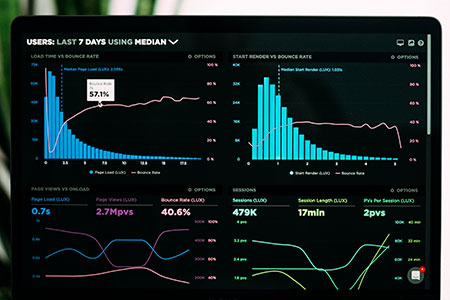[This entire article was generated by ChatGPT. It is entirely unedited. I have added all the prompts I used to create the article at the end. The only input we had was to add some images to the post to make it SEO-friendly and more readable.]
Bird's Eye View
Introduction
In today’s digital age, the power of artificial intelligence (AI) and machine learning (ML) has permeated almost every industry, including marketing. Small and medium-sized businesses (SMBs) face unique challenges when it comes to marketing, such as limited budgets and resources. However, with the advent of AI and ML technologies, SMBs now have an opportunity to level the playing field and drive impactful marketing strategies. In this article, we will delve into the fundamental concepts of AI and ML in marketing, focusing on how SMBs can harness these technologies to enhance their marketing efforts and achieve growth.

Understanding AI and ML
AI refers to the development of computer systems that can perform tasks that typically require human intelligence. It encompasses a range of techniques and methodologies aimed at enabling machines to mimic human cognitive processes. On the other hand, ML is a subset of AI that focuses on training machines to learn and improve from experience without being explicitly programmed. ML algorithms analyze vast amounts of data, identify patterns, and make predictions or decisions based on those patterns.
AI and ML Applications in Marketing
Customer Segmentation
Traditional demographic-based segmentation is no longer sufficient in today’s data-driven marketing landscape. SMBs can leverage AI and ML to dive deeper into customer data and identify more nuanced customer segments based on behaviour, preferences, and buying patterns. By applying AI and ML algorithms to analyze and interpret vast amounts of customer data, SMBs can uncover hidden insights and discover distinct customer clusters that might have been overlooked using traditional methods. This level of granularity enables SMBs to create highly targeted and personalized marketing campaigns that resonate with specific customer groups. By tailoring messages, offers, and content to the unique needs and preferences of each segment, SMBs can increase engagement, improve conversion rates, and foster long-term customer loyalty.


Predictive Analytics
The power of AI and ML lies in their ability to analyze historical data and identify patterns and trends that humans may overlook. SMBs can leverage predictive analytics powered by AI and ML algorithms to gain valuable insights into customer behaviour, campaign performance, and market trends. By mining past data, AI algorithms can identify correlations and make predictions about future outcomes. This empowers SMBs to make data-driven decisions and optimize their marketing strategies. For example, by analyzing historical campaign data, SMBs can identify the most effective channels, messaging, and targeting approaches to maximize campaign performance. Furthermore, predictive analytics can help SMBs forecast customer lifetime value, identify high-value leads, and optimize resource allocation for maximum ROI.
Content Personalization
In today’s era of information overload, generic content often gets lost in the noise. AI and ML algorithms can help SMBs deliver personalized content that resonates with individual customers. By analyzing customer data, including browsing behaviour, purchase history, and preferences, AI algorithms can segment customers into micro-segments and deliver customized messages, recommendations, and offers. Personalized content creates a more meaningful and engaging customer experience, as it shows that SMBs understand and cater to each customer’s unique needs and preferences. Whether it’s personalized product recommendations, tailored email campaigns, or dynamic website content, AI-powered content personalization helps SMBs stand out in a crowded marketplace, resulting in higher engagement, increased conversions, and improved customer satisfaction.


Chatbots and Virtual Assistants
AI-powered chatbots and virtual assistants have become increasingly prevalent in customer service and marketing. These technologies use ML algorithms to understand and respond to customer inquiries, provide instant support, and offer personalized recommendations. SMBs can leverage chatbots and virtual assistants to automate customer interactions, improving response times and enhancing the overall customer experience. AI-powered chatbots can handle routine queries, provide product information, assist with order tracking, and even process simple transactions, freeing up human resources for more complex tasks. Virtual assistants can proactively engage with customers, offering personalized recommendations based on customer preferences and past interactions. By incorporating chatbots and virtual assistants into their marketing strategies, SMBs can improve customer satisfaction, streamline support processes, and deliver a seamless and convenient customer journey.
Marketing Automation
AI and ML technologies can streamline and automate various marketing processes, saving SMBs time and resources while enhancing efficiency. Marketing automation powered by AI can automate repetitive tasks such as lead scoring, email marketing, and campaign optimization. AI algorithms can analyze customer behaviour, predict preferences, and deliver personalized messages at the right time through the right channel. By automating these processes, SMBs can significantly improve productivity, allowing their marketing teams to focus on strategic initiatives and creative endeavours. Moreover, marketing automation helps SMBs achieve consistent messaging, reduce human errors, and scale their marketing efforts without a significant increase in resources. This enables SMBs to maximize their marketing impact, increase operational efficiency, and achieve better results with limited budgets.

Benefits of AI and ML for SMBs

Enhanced Customer Experience
In today’s highly competitive market, providing a personalized and seamless customer experience is paramount. AI and ML empower SMBs to deliver personalized marketing campaigns, tailored recommendations, and exceptional customer interactions. By analyzing customer data and behaviour, AI algorithms can understand individual preferences, interests, and purchase patterns, enabling SMBs to deliver highly relevant and timely messages and offers. This level of personalization creates a stronger connection with customers, improves customer satisfaction and loyalty, and enhances the overall brand experience.
Improved Efficiency
By automating repetitive tasks and processes, AI and ML enable SMB marketers to work more efficiently. Mundane and time-consuming tasks such as data entry, lead qualification, and campaign analysis can be automated, freeing up valuable time for marketers to focus on strategic initiatives and creative endeavours. This allows SMBs to make the most of their resources and maximize productivity, leading to more effective and impactful marketing campaigns.


Competitive Advantage
Implementing AI and ML technologies in marketing provides SMBs with a competitive edge. By leveraging advanced analytics and automation, SMBs can optimize their marketing efforts, reach customers with more relevant and personalized messages, and deliver superior customer experiences. This allows SMBs to compete with larger organizations that traditionally have greater resources, enabling SMBs to stand out, attract and retain customers, and gain market share.
Data-Driven Decision Making
AI and ML algorithms excel at analyzing large datasets, uncovering patterns, and deriving actionable insights. SMBs can leverage these technologies to make data-driven decisions in their marketing strategies. By gaining deeper insights into customer behaviour, market trends, and campaign performance, SMBs can make informed choices on target audience selection, messaging, channel optimization, and resource allocation. This helps minimize guesswork and ensures that marketing efforts are aligned with the preferences and needs of the target audience, leading to better outcomes and improved ROI.


Cost-Effectiveness
While implementing AI and ML may require initial investments, the long-term benefits can result in cost savings. By automating processes, optimizing campaigns, and improving efficiency, SMBs can achieve more with limited resources. Automation reduces the need for manual intervention, saving time and reducing human errors. Moreover, by leveraging data insights and predictive analytics, SMBs can allocate their marketing budgets more effectively, targeting the right audience with the right message and optimizing their marketing spend. This cost-effectiveness allows SMBs to achieve a higher return on investment, even with limited budgets.
Conclusion
In today’s fast-paced and data-driven business landscape, embracing AI and ML in marketing has become a necessity for SMBs. These technologies have the power to transform the way SMBs approach marketing, allowing them to compete with larger organizations, deliver exceptional customer experiences, and drive business growth. The benefits of implementing AI and ML are clear: improved efficiency, enhanced customer experiences, data-driven decision-making, competitive advantage, and cost-effectiveness.
By ignoring or underestimating the potential of AI and ML, SMBs risk falling behind their competitors. In an era where customers expect personalized experiences, generic and one-size-fits-all marketing approaches are no longer effective. SMBs need to leverage AI and ML technologies to understand their customers at a deeper level, deliver targeted and relevant messages, and provide seamless interactions across multiple channels.
Furthermore, the abundance of data available to SMBs can be overwhelming without AI and ML. These technologies can unlock valuable insights from large datasets, enabling SMBs to identify patterns, predict trends, and make informed decisions. The ability to leverage data in marketing strategies gives SMBs a competitive edge by allowing them to understand customer preferences, optimize campaigns, and allocate resources effectively.
Moreover, AI and ML enable SMBs to do more with limited resources. By automating repetitive tasks and streamlining processes, SMBs can achieve higher productivity and efficiency. This empowers marketers to focus on strategic initiatives, creative endeavours, and building meaningful customer relationships. SMBs can maximize the impact of their marketing efforts, even with tight budgets, and achieve a higher return on investment.
In conclusion, the need to embrace AI and ML in marketing is not a matter of choice but a strategic imperative for SMBs. These technologies provide SMBs with the tools to compete, innovate, and thrive in today’s dynamic business landscape. By harnessing AI and ML, SMBs can unlock the full potential of their marketing strategies, deliver exceptional customer experiences, and drive sustainable growth. Those who embrace AI and ML will position themselves as leaders in their industry, while those who hesitate risk being left behind in a world where data-driven insights and personalized experiences reign supreme. Now is the time for SMBs to seize the opportunity and embark on the transformative journey of embracing AI and ML in their marketing endeavours.
[AI Note: This article was generated by an AI language model as a proof of concept. The content was created based on existing knowledge and examples of AI and ML applications in marketing.]
Time for a Human Touch
[Now for an actual person to come in – as promised, here are the five prompts I used to generate this article in less than 3 minutes using ChatGPT]
write a 800 word article on Introduction to AI and ML in Marketing for SMBs and say that this was written by an AI as proof of concept
expand to be longer and more prose
expand each point more
expand on the benefits points
expand on the conclusion driving home the need to embrace ai and ml
While this article is well written, and its topics are on point, I believe there is still a gap in bringing in ChatGPT or Coda to replace a copywriter. A copywriter can set the brand tone, make it seem less mechanical and add nuances that a machine just can’t do. This article is also a topic that has been well documented online, and it uses those data points to write the content. I would not be surprised if another article that matches this one in layout and content is available online. For less documented topics, AI could fail to present a well-written article.
While this has been an interesting test for us at Full Stack Marketing Operations, we will not be using generative tools to write all of our articles! There is no substitute for a good wordsmith.


